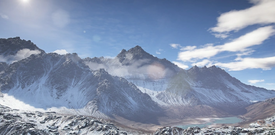Chayaltaca: Difference between revisions
Mr.Trumpet (talk | contribs) |
Mr.Trumpet (talk | contribs) |
||
| Line 79: | Line 79: | ||
==Points of Interest== | ==Points of Interest== | ||
* '''[[Pico del Alba]]:''' The highest peak in the | * '''[[Pico del Alba]]:''' The highest peak in the wurld, attracting climbers and adventurers from around the globe. Its snowy slopes and spectacular views make it an iconic location. | ||
* '''Ruinas de Piko:''' Ancient [[Tuachec Empire|Tuachec]] ruins that testify to the region's rich cultural history linked to the Tuachec history. | * '''Ruinas de Piko:''' Ancient [[Tuachec Empire|Tuachec]] ruins that testify to the region's rich cultural history linked to the Tuachec history. | ||
* '''Pukara:''' The capital of Chayaltaca, Pukara is a central hub for llama breeding. The town serves as the economic and cultural heart of the region, hosting markets, festivals, and serving as the base for regional governance. | * '''Pukara:''' The capital of Chayaltaca, Pukara is a central hub for llama breeding. The town serves as the economic and cultural heart of the region, hosting markets, festivals, and serving as the base for regional governance. | ||
Revision as of 11:53, 25 June 2024
Chayaltaca | |
|---|---|
Department | |
 | |
| Country | Pecario |
| Government | |
| • Type | Departmental Legislative Assembly of Chayaltaca |
| • Governor | Edgar Zanhuesa |
| Population | |
| • Total | 800,000 |
| Demonym | Chayaltacan |
| Area code | 589 |
| Website | departamentodechacaltaya.gov |
Chacaltaya is a department of Pecario. It is a mountainous, arid and snowy region. Chayaltaca is dominated by the majestic Pico del Alba, the highest peak in the wurld, situated in the Cordillera del Sol. This department, with its desolate landscapes and imposing mountains, is both a natural treasure and a strategic stronghold. The capital of the region is the town of Pukara.
Fauna
The fauna of Chayaltaca is diverse and well-adapted to its extreme environment. The region is home to vicuñas, guanacos and llamas, which are commonly seen grazing in open areas. Condors, vultures and various small birds often soar the skies. Wolves can be encountered in more remote and rugged areas, as well as pumas. Despite the harsh climate, the biodiversity is surprisingly rich in this part of Pecario
Economy
The economy of Chayaltaca is primarily based on subsistence agriculture, livestock, and crafts, with inhabitants living in picturesque and isolated villages. Due to the climate and terrain, llama and alpaca farming is very common. These animals are essential for the locals, providing wool, meat, and transport. Alpaca wool is particularly prized for making traditional clothing and handicrafts. The region, mainly found in snowy areas, is adapted for agriculture. The cultivation of potatoes, quinoa, and maize on terraces is common, perfectly suiting the mountainous conditions. Local crafts, including traditional textiles made from alpaca wool, are renowned in all Pecario. However, the economy is heavily influenced by clandestine activities. The Santa Polvo cartel, a powerful criminal group, uses Chacaltaya's rugged terrain for its drug production and trafficking operations, exploiting caves and isolated plateaus to hide laboratories and weapon caches.
Municipalities
Points of Interest
- Pico del Alba: The highest peak in the wurld, attracting climbers and adventurers from around the globe. Its snowy slopes and spectacular views make it an iconic location.
- Ruinas de Piko: Ancient Tuachec ruins that testify to the region's rich cultural history linked to the Tuachec history.
- Pukara: The capital of Chayaltaca, Pukara is a central hub for llama breeding. The town serves as the economic and cultural heart of the region, hosting markets, festivals, and serving as the base for regional governance.
- Traditional Villages: Villages like Quillacocha and Tambo Alto, where inhabitants live traditionally, perpetuating ancestral indegenous customs and craft techniques.
- Virgin Mary statue: The statue is situated atop of the moutain peak Púrpura at an altitude of 3,900 meters (12,800 feet) above sea level. The satue depicts the Virgin Mary standing with outstretched arms, facing outward as if watching over the surrounding landscape. Her posture conveys a sense of protection and vigilance.